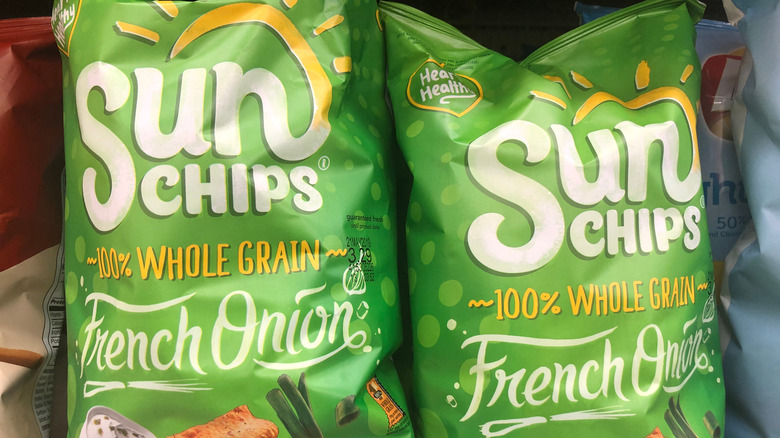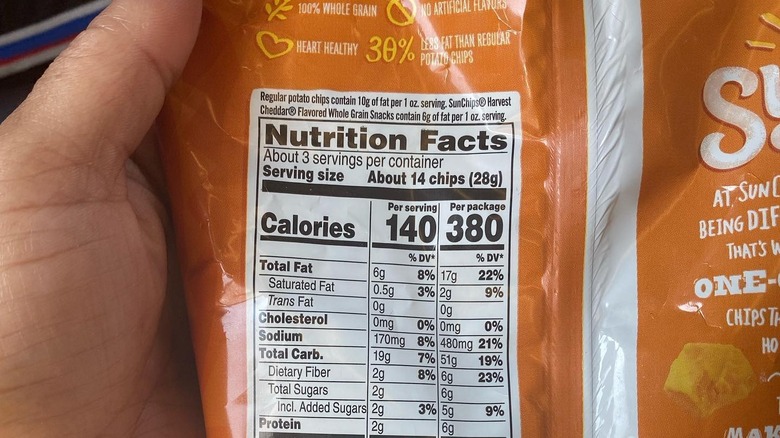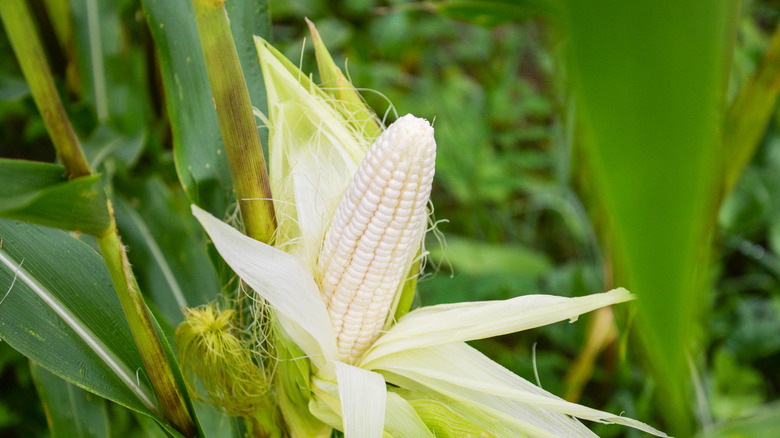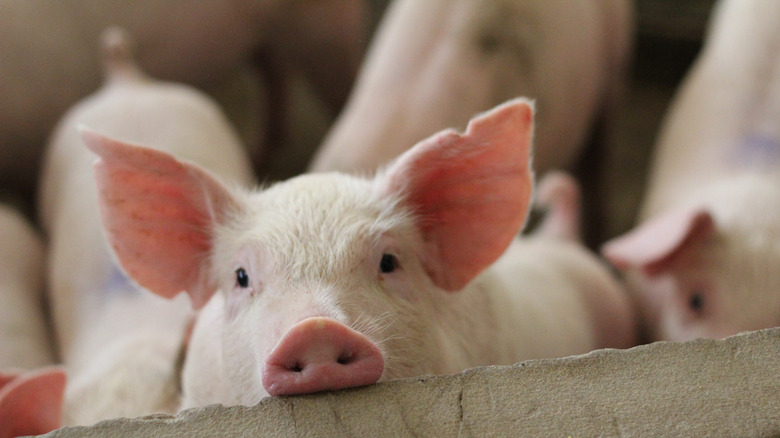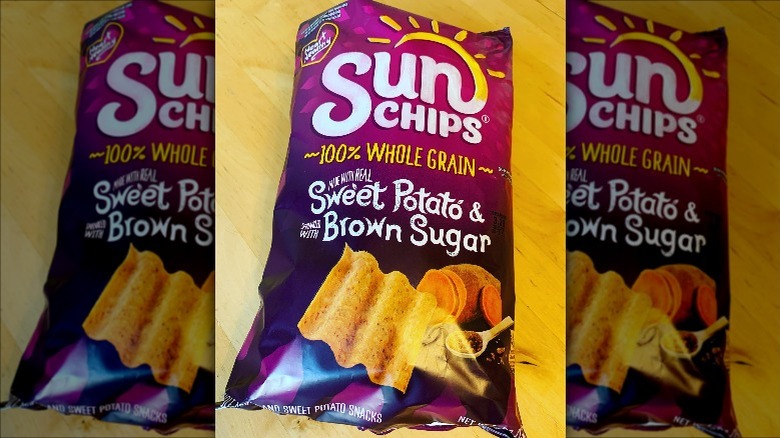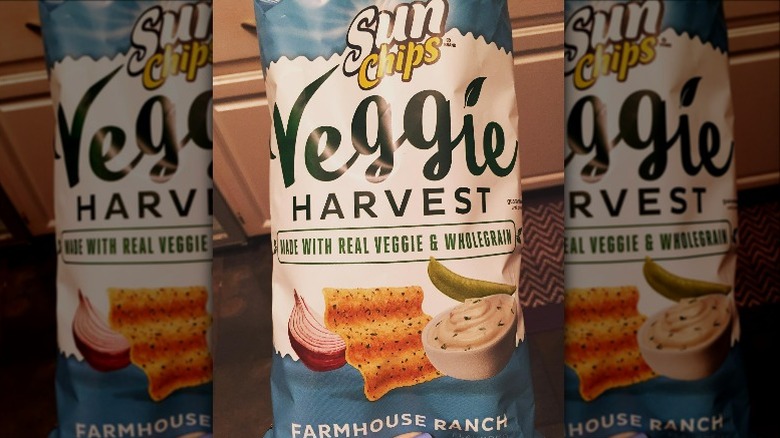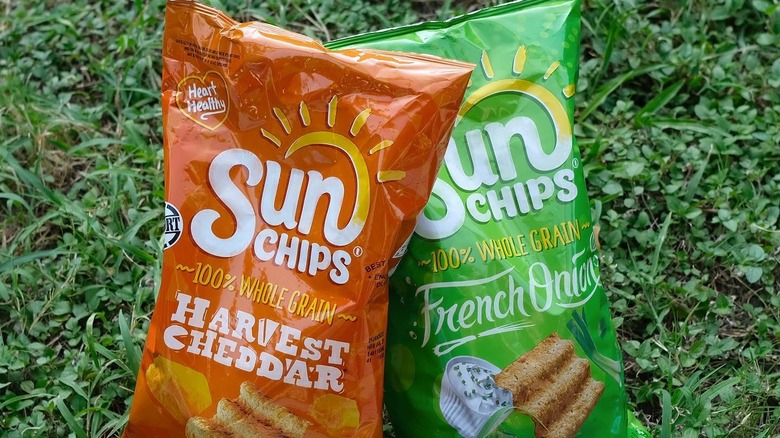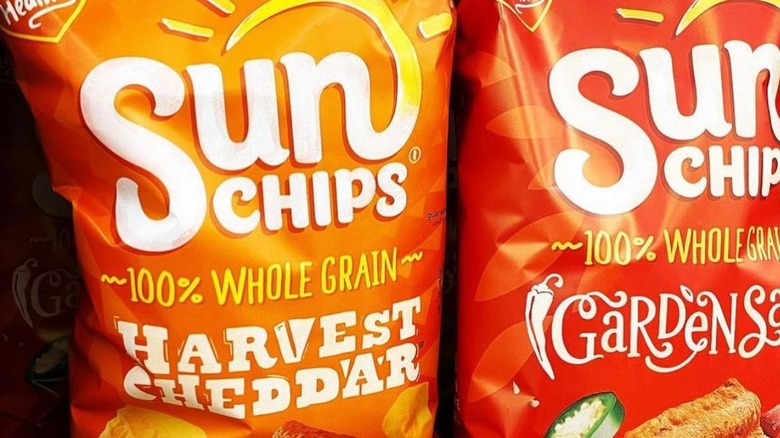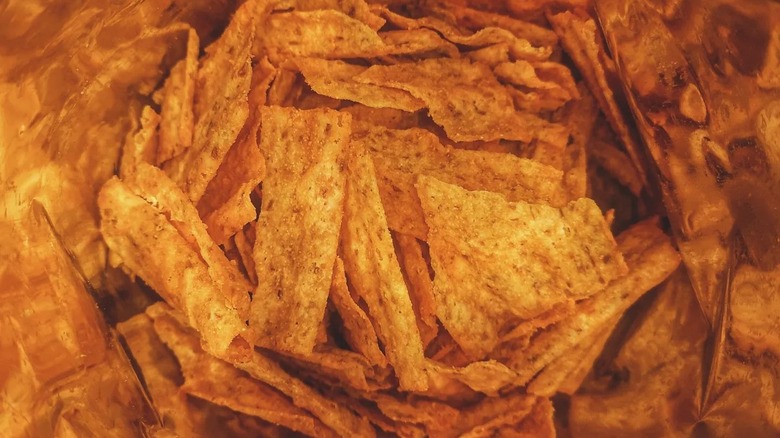The Untold Truth Of Sun Chips
Frito-Lay first introduced Sun Chips to the world in 1991, meaning they're technically millennials (via Sun Chips). For over three decades now, these multigrain marvels have radiated an aura of health in contrast to the usual bags of Lay's, Cheetos, and Doritos in the snack food aisle. Sun Chips proudly advertise their heart-healthy status and whole-grain content on their packaging, but fans keep coming back for their captivating flavors, uniquely wavy square shape, and crunchy texture.
There's a lot more to Sun Chips, however, than meets the eye — or the mouth. Not only are they not nearly as healthy as you might think (or hope), they may contain some surprising ingredients that you aren't expecting (like pork). They have been associated with some great strides in environmentally-friendly manufacturing, even if one of those endeavors did result in an infamous backlash against loud Sun Chips bags.
Whether you're a fan of these nostalgic '90s snacks or love to hate their dubious health claims and sometimes-divisive texture, there's a lot of interesting information to chew on where Sun Chips are concerned. For instance, they're considered a type of fabricated chip, according to the "Technology of Extrusion Cooking" and they took over 10 years to perfect (via Google Books).
Here's everything else you need to know about Sun Chips.
Sun Chips are actually made with solar power
In 2008, Frito-Lay's parent company, PepsiCo, began harnessing solar power at their Modesto, CA factory, one of the locations where Sun Chips are manufactured (via The New York Times). At the time, PepsiCo advertised that fact via billboards, television commercials, social media posts, and product packaging. While it clearly wanted to highlight its commitment to environmental responsibility to the buying public, it was more than just a marketing stunt. The company actually implemented long-term sustainability measures.
Indeed, in 2020, PepsiCo reported that it was using 100% renewable electricity for its U.S. direct operations.
In the beginning, the sun in Sun Chips' name didn't refer to solar power but instead highlighted the brand's perceived healthiness and wholesomeness. From their earliest days, Sun Chips have touted their whole-grain status and featured radiant scenes in ads and on bags. A 1991 television commercial for Sun Chips talks about "the sun-drenched taste of multigrain." A 1992 ad shows an outdoorsy young couple enjoying Sun Chips and uses the tagline, "A little sun never tasted so good."
Former processed food marketer Bruce Bradley has written about the power of the sun as a branding element. He argues that some of Sun Chips' advertising campaigns in particular were cleverly engineered to make you associate them with healthier choices.
Sun Chips aren't as healthy as you might think
Each Sun Chips bag boldly features the words "heart healthy" and "100% whole grain," as well as "no artificial flavors or preservatives" and "30% less fat than regular potato chips" (via Walmart)
Are Sun Chips actually healthy? Let's look at the numbers. A single serving is around one ounce, between 14 and 16 Sun Chips. That serving contains 140 calories, 6 grams of fat (0.5 of which is saturated fat), no cholesterol, 110 milligrams of sodium, 19 grams of carbs, 2 grams of fiber, 2 grams of sugar (all of which is added sugar), and 2 grams of protein. That's the Original Sun Chips flavor. If you pick another flavor, the nutritional stats vary somewhat. Harvest Cheddar Sun Chips, for instance, have 170 milligrams of sodium, but otherwise are identical in terms of nutrition (via Sun Chips)
A one-ounce serving of plain Lay's potato chips (roughly 15 chips), by contrast, contains 160 calories, 10 grams of fat (1.5 grams of which is saturated), no cholesterol, 170 milligrams of sodium, 15 grams of carbs, 1 gram of fiber, less than 1 of gram sugar (none of which is added sugar), and 2 grams protein.
Sun Chips are fried, not baked. They have slightly more fiber than regular chips, but not dramatically more. Everyday Health says that while the fiber content is only marginally higher, every little bit helps make you feel fuller.
Sun Chips do contain genetically modified corn
What "whole grains" are Sun Chips made from, specifically? Whole wheat, brown rice flour, and whole oat flour all factor in (ditto sunflower and/or canola oil, sugar, salt, natural flavor, and maltodextrin), but the number one ingredient is whole corn (via Sun Chips). Some people have expressed concern that the corn in question is genetically modified. In the past, Organic Sun Chips were offered, but they aren't listed on the current website for Sun Chips.
GMO crops are bred to be more resistant to natural pests and to be more tolerant to common herbicides. Detractors, including the Non GMO Project, suggest that there is not enough long-term, credibly produced research proving that GMO ingredients are safe to ingest. However, according to Cornell, there is ample research to prove that GMOs are totally safe.
The Non GMO Project also raises concerns about herbicides like Roundup, which is sprayed on some GMO crops. Its active ingredient, glyphosate, is a possible carcinogen. It's worth noting that glyphosate is used on plenty of non-GMO crops too. Per Only Organic, it can even appear on organically grown crops. The EPA claims that glyphosate does not pose a human health risk when used properly.
GMO crops are so widespread as to be virtually inescapable, especially if you're eating any sort of processed snack (via the FDA). And even fresh produce can contain traces of glyphosate. The occasional bag of Sun Chips isn't going to make much difference.
Some Sun Chips may have contained pork enzymes
Although there's never been a bacon flavor of Sun Chips on offer, in the past, some Sun Chips have contained porcine enzymes. These are substances derived from pigs, which is clearly a major issue not just for vegetarians and vegans, but for followers of various religious dietary laws. Porcine enzymes fall under the catch-all of "natural flavorings" — so it's a safe bet that they've likely never been listed as a stand-alone ingredient on any product package. You will, however, see plain old "enzymes" in many ingredients lists, which may or may not refer to pork-derived enzymes.
So, what are these pork products doing in chips that have no overt meaty associations at all? Porcine enzymes have been used to develop the flavor of cheesy seasonings in many snack foods, including Cheetos, Ruffles, Fritos, and Sun Chips (via Healthy Food Lazy People).
Frito-Lay provides a list of some of their U.S. products that don't contain pork enzymes that includes all current flavors of Sun Chips. If your chief concern is avoiding animal products of any kind, you should know that only Sun Chips Original flavor is vegan. All other Sun Chips flavors contain dairy in some form, mostly milk, often in the form of whey, casein, or lactose (via Your Vegan Journey). Even the safe-seeming Garden Salsa Sun Chips contain buttermilk, cheddar and romano cheese, and whey.
Sun Chips fans are passionate about their favorite flavors
In addition to the Original Sun Chips variety, Harvest Cheddar Sun Chips and French Onion Sun Chips have never gone out of style. Other flavors, however, have faded from collective consciousness. Onion and Thyme Sun Chips, anyone? Perhaps you still yearn for Peppercorn Ranch or the more recently discontinued Sweet & Spicy BBQ Sun Chips. Taquitos.net has a comprehensive list of all Sun Chips flavors, extant and extinct, to jog your memory, but a couple deserve special mention.
Sun Chips Sweet Potato & Brown Sugar was a seasonal fall flavor that seems to have had a lot of fans who voiced their outrage on Twitter when the product was discontinued. Sun Chips said they might start making this flavor again in the future, but they made no promises.
Meanwhile, Baja Picante Sun Chips are still around, but only available in bags of Munchies Flamin' Hot snack mix — a travesty, to the minds of some fiery snack fans. There is a fairly sluggish but still active Change.org petition to get Frito-Lay to start selling these spicy Sun Chips on their own.
The company might be pretty ruthless when it comes to ditching old flavors, but it's always cooking up new ideas too. Sun Chips have teased the possibility of new options coming in 2022 (via Facebook).
Sun Chips Veggie Harvest weren't much different from normal Sun Chips
There have been some special types of Sun Chips that messed with the chips' formula, including Sun Puffs and Sun Chips 6 Grain Medleys, which added buckwheat, kamut, and quinoa to the usual blend of corn, wheat, and oats.
Sun Chips Veggie Harvest proudly proclaimed on the bag that they were "made with real veggie," but that was an exaggeration at best. They did contain dried yellow peas in addition to the usual Sun Chips ingredients, but that's it (via Frito-Lay). Granted, the Tomato, Basil & Cheese flavor at least had some more plant matter in the seasonings — but they also contained 125 milligrams of sodium per serving, so were hardly an automatically healthier choice.
These chips are no longer listed on the Sun Chips website, so they appear to have bitten the dust. They join another failed PepsiCo vegetable chip brand, Flat Earth (via Food Processing Technology).
Sun Chips were once well-known for their loud packaging
In addition to their clear commitment to solar power, Sun Chips once touted another sustainability initiative. However, this one led to them being soundly ridiculed.
In 2009, PepsiCo introduced the very first compostable chip bag. The biodegradable bag was made from a plant starch-based polymer called polylactic acid, or PLA, and was designed to break down in a compost pile in roughly 14 weeks. Who could possibly criticize that? Almost everyone, as it turned out. According to The Wall Street Journal, the pioneering compostable Sun Chips bag was incredibly loud, crackling and crunching at a decibel volume higher than that of a lawnmower or, allegedly, an Air Force jet cockpit.
While Frito-Lay insisted it was the sound of progress, people had a field day with it, mostly in good fun — but per SymphonyIRI Group, sales of Sun Chips dropped more than 11% over the course of the following year (via USA Today).
At one point, says Fast Company, PepsiCo began adding a layer of adhesive to muffle the noise to a more reasonable 70 decibels, but by 2011, the loud Sun Chips bag was a mere memory. According to the USDA, the company is still experimenting with ways to go greener, including developing a better PLA-based bag.
Sun Chips took a long time to perfect
Although Sun Chips have been on shelves since 1991, they were in development for at least 10 years, according to The New York Times.
The impetus for their creation was Frito-Lay's wish to keep people buying snack foods into adulthood. According to then-senior vice president of marketing, David J. Guston, the company thought a multigrain product was a good bet for older, more health-conscious consumers. As early as the 1970s, Frito-Lay trademarked Prontos, which were "chips primarily composed of corn, oats, and whole grain wheat" (via Justia).
In the pursuit of perfection, the company conducted 10,000 consumer taste tests before landing on the winning Sun Chips formula. In the early '90s, it also tried out a durum wheat-based snack called Suprimos, which had a cheesy coating that obviously wasn't enough to make them a hit. The patent filed on June 11, 1990 for that particular brand of "wheat-based snack chips" was canceled in 1999 (per Justia).
According to Snack Stack, Frito-Lay spent $40 million on new equipment to manufacture Sun Chips and another $30 million on marketing in their first year. At the time of Sun Chips' introduction, Frito-Lay was the smallest of PepsiCo's divisions yet led the way in sales, with nearly $1 billion in profits in 1990.
Sun Chips made them $100 million in sales during their first year on the market alone — so clearly all that time and money was well spent.
There's nothing else quite like them on the market
The ripply, square shape of Sun Chips, their slightly sweet and earthy flavor, and their nubbly sort of texture all make them quite distinct from potato chips and even other corn-based snacks. But they didn't always stand alone.
In the early 1990s, snack company Borden introduced Graingers to test markets in the midwest (per the Chicago Tribune). These multigrain chips made $3.3 million for Borden during the same period that Sun Chips earned Frito-Lay $84 million, but a Borden representative was "quite optimistic" at the time.
Keebler's Quangles were another '90s-era competitor that quietly rode off into the sun.
Today, there are plenty of whole grain snack foods on the market, yet none are really quite comparable to Sun Chips. No other chips combine the distinctive corrugated texture or intense flavor coating of Sun Chips. When you're craving Sun Chips, there's really only one solution.
America isn't the only country that loves this iconic snack, either. In 2007, Sun Chips came to the UK under the name SunBites, which boast flavors the U.S. has never had, including Roasted Onion & Turmeric. In Korea, under the Orion brand name, Sun chips come in flavors like Garlic Baguette — proving there is always something new under the sun.
